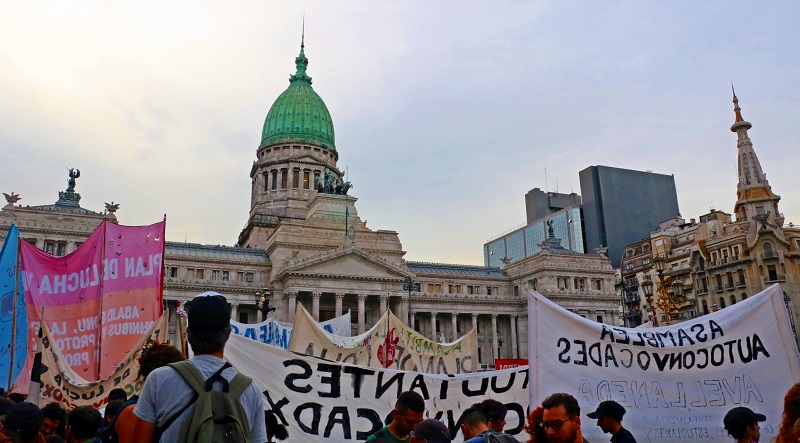
One week after the defeat of the Omnibus Law in the Chamber of Deputies, which no discursive device can hide, its consequences are becoming noticeable. Firstly, the discussions for some type of greater integration of the PRO into the government. Strategically an agreement or, even more, a merger between Freedom Advances and Mauricio Macri’s party It would be based both on international precedents where, once in government, far-right leaderships absorb the bulk of the pre-existing center-right forces (Trump staying with the Republican Party or Bolsonaro with all the space of the right-wing opposition to the PT), as well as on what was previously stated by Milei or Macri.
Tactically the questionhowever, it is more complex and it boils down to the question if the PRO will go after Milei or if Milei will remain a little more than a decorative figure of what would become a second Macrista government. Even adopting a first economic plan -in principle designed for Patricia Bullrich by Sturzenegger-, Milei sought to maintain a certain autonomy with respect to Macri and the PRO by incorporating officials of Peronist origin or who passed through their governments (such as Francos or Ferraro), and from governments provincial ones such as those of Córdoba and Salta.
He Milei of the first two months of government was excited that the 56% of the votes obtained in the second round would be enough to overcome its weak institutional representation (only 38 of 257 deputies, 7 of 72 senators and no governorship) managing to discipline Congress and allow it to approve the Omnibus Law (with minor concessions) and not to reject the DNU, while Caputo adjusted left and right from the Ministry of Economy . This plan is the one that failed with the forced withdrawal of the Omnibus Law.
¿Why a law that the AEA supported failed (Argentine Business Association, where the local business leadership is located), la AmCham (Argentine American Chamber of Commerce, which brings together US multinationals operating in the country), the UIA, the IMF and the entire local employer spectrum? Although it initially generated opposition from rural employers’ associations and different regional business sectors due to the increase in withholdings and/or deregulatory measures, the ruling that was discussed in the chamber no longer had the most conflictive measures for other capitalist sectors.
As far as I know The key to understanding this first government failure is given by the two margins in which these negotiations took place.: he of the agreement with the IMF and the of the growth of popular discontent with the Mileist administration, not only expressed by those who did not vote for him but also by a segment of those who voted for him in the runoff, even in provinces like Córdoba and Mendoza. It is not yet a collapse but yes, a dynamic that will possibly increase in the next two or three months. Just as the commitments with the IMF limited the margin of concessions that the government could make (such as the co-participation of the PAIS tax demanded by the Córdoba government), the groundswell of popular discontent explains why the governors have raised their demands to approve the law. and that the collaborationist blocs of the UCR and We Make the Federal Coalition (the heterogeneous group that Pichetto pretends to lead) have been divided at the time of the vote in particular. Why immolate ourselves without getting anything in return by voting in favor of anti-popular measures from a government that is declining in social support? They must have asked themselves. Another version of the “impossible hegemony” would say Fernando Rosso, where the economy” (i.e. the worsening of the hardships of the masses) liquefy all electoral success.
That discontent had an active expression from the beginning. The march driven by the left and the banging of pots and pans on the night of December 20th; the first action of the CGT a week later; he 12 hour general strike and the massive marches of the January 24; and, finally, the actions of a vanguard that took to the streets in front of Congress during the treatment of the law, led by the Neighborhood assemblies of CABA and Greater Buenos Aires and on the leftwhat They bravely faced repression with pepper spray and rubber bullets by Patricia Bullrich. All this in the middle of the holiday period and with Peronism in the double game of opposing it in Parliament but stopping the mobilization in the streets with the “argument” of hoping that the contradictions of the government’s plan will make it fall by itself.
Obviously the discursive devices of the government to disguise the defeat and its need to reset do not withstand even the slightest analysis. If everything was meticulously planned to “expose the caste”, the hours and hours of negotiations with the collaborationist opposition, the rush to pass the mega law or an opinion signed in blank and with 34 signatures in dissent out of the 55 that endorsed it, they would not have happened. ¿Why did Milei praise the PRO, De Loredo and Pichetto when the law was approved in general?? Then, the votes against delegating powers in security and in the management of trust funds to the provinces only indicated that the privatization package was not going to be approved as it was and that the modifications to the penal code were unlikely to be approved. The passing of the law to commission, which meant his withdrawal, was at this point the lesser evil for the government.
What’s ahead? On the one hand, and in the immediate future, we must see how far the reset of a government that showed its weakness goes. We point it out: an attempt at “weak” Bonapartism, when many were impressed by the 56% of the runoff and the contradictions of the new government decreased. A government that despite the support of the big bourgeoisie, it can lead to a general crisis if a occurs drastic drop in the social base that it still retains, and it is the political capital that, although declining, still allows it to stay afloat.
This weaknesswhich was laid bare with the defeat of the Omnibus Law, is what pushes the constitution of a bloc between Freedom Advances and most of the PRO, although it remains to be known, no less, who will have the real preeminence. Will Milei absorb the PRO, already a sector of radicalism, as Trump did with the Republican Party or will Macri end up “infiltrating” Mileism and have his “second time” despite the fact that his force came third in the elections? Although a greater agreement with the PRO gives him a more powerful support, how can we avoid the image of “double command” if Milei cedes ministries or central positions such as the presidency of the Chamber of Deputies to Macri’s party? We will see.
Given what happened these days the Pichetto plan (on which a sector of the bourgeoisie is betting), to achieve a “European-style” parliamentary governance agreement, with the set of forces that allowed the approval of the law in general, it does not seem that it can be achieved. Rather Milei continues to bet on discursive polarization since the space of “centrist collaborationism” (radicals, Cordobans, Larretismo, etc.) is diluted. All this, however, could founder if the adjustment in progress causes popular discontent to jump. liquefying an already diminished presidential power.
Peronismfor its part, will continue as long as it can in its double game, of parliamentary opposition and street demobilization, with its main references such as Cristina Fernández de Kirchner or Sergio Massa without saying a word but implying that you don’t have to win the streets.
The CGT lifted all action after the January 24 strike. Their militancy does not promote neighborhood assemblies or any organizational body and mobilization from below. Not even the discursive opponent Juan Grabois, as active in the media related to Peronism as he is inactive in the streets.. They are betting on resolving their leadership crisis over time and to reissue the “there is 2019”, which allowed them to return to the government after the Macrista period.
But the truth is that The magnitude of the ongoing attack is likely to make this strategy an impossible. He growing discontent, with salaries and pension income pulverizedgoing to express in mass mobilizations and strikes sooner rather than later. Of teaching announces a non-start of classes if the teaching incentive and other items that the government illegally cut are not paid. And what will be the popular reaction to the increase in transportation and fares? And given the lack of food delivery to soup kitchens? Let us not forget that much smaller increases in transportation rates unleashed massive protests in our region, in Brazil in 2013 or in Chile in 2019.
From the left we have put all our forces into confronting Milei’s “chainsaw and blender” plan from the beginning.. We denounce and mobilize against this government’s combo of terror: Caputo’s measures, with the 118% devaluation and the liberalization of prices for food, medicine and fuel; DNU 70/23; Bullrich’s anti-demonstration protocol; and the Omnibus Law, being to the extent of our strength, outside and inside Congressand factor for its failure. We use the parliamentary tribune Not only to denounce the implications of the lawwhich the government and its accomplices intended to hide, but especially to promote popular mobilization against them, which earned us attacks from the government.
We say clearly that give time to a government that has already shown that it comes for everything, as Peronism encourages, It is a criminal policywhich can only serve to give Milei some chance to overcome his weaknesses and succeed in his attacks against the working class and in national delivery.
Our militancy supports and promotes the neighborhood assemblies that have begun to be established in CABA, greater Buenos Aires and other sectors of the countryan instance of self-organization that we call to strengthen, especially to those who have been voting for us. And to come together with the working class, its struggles and its organizations.
Why Faced with the war plan launched by Milei and the big bosses, it is only stopped by the growth of the self-activity of the mass movement, which is the only thing that can get the leadership of the central offices out of their passivity.the unions and the social movements aligned with Peronism, and at the same time overcome them in the struggle by imposing a plan of struggle and a true general strike that defeats the entire adjustment plan.
We call at the same time draw political conclusions regarding the need to overcome Peronism, which after Macrismo returned to the government and continuing the adjustment only allowed Milei’s victory. A truly anti-capitalist and socialist solution is needed, without which our country has no destiny. We bet on it.
Source: www.laizquierdadiario.com

